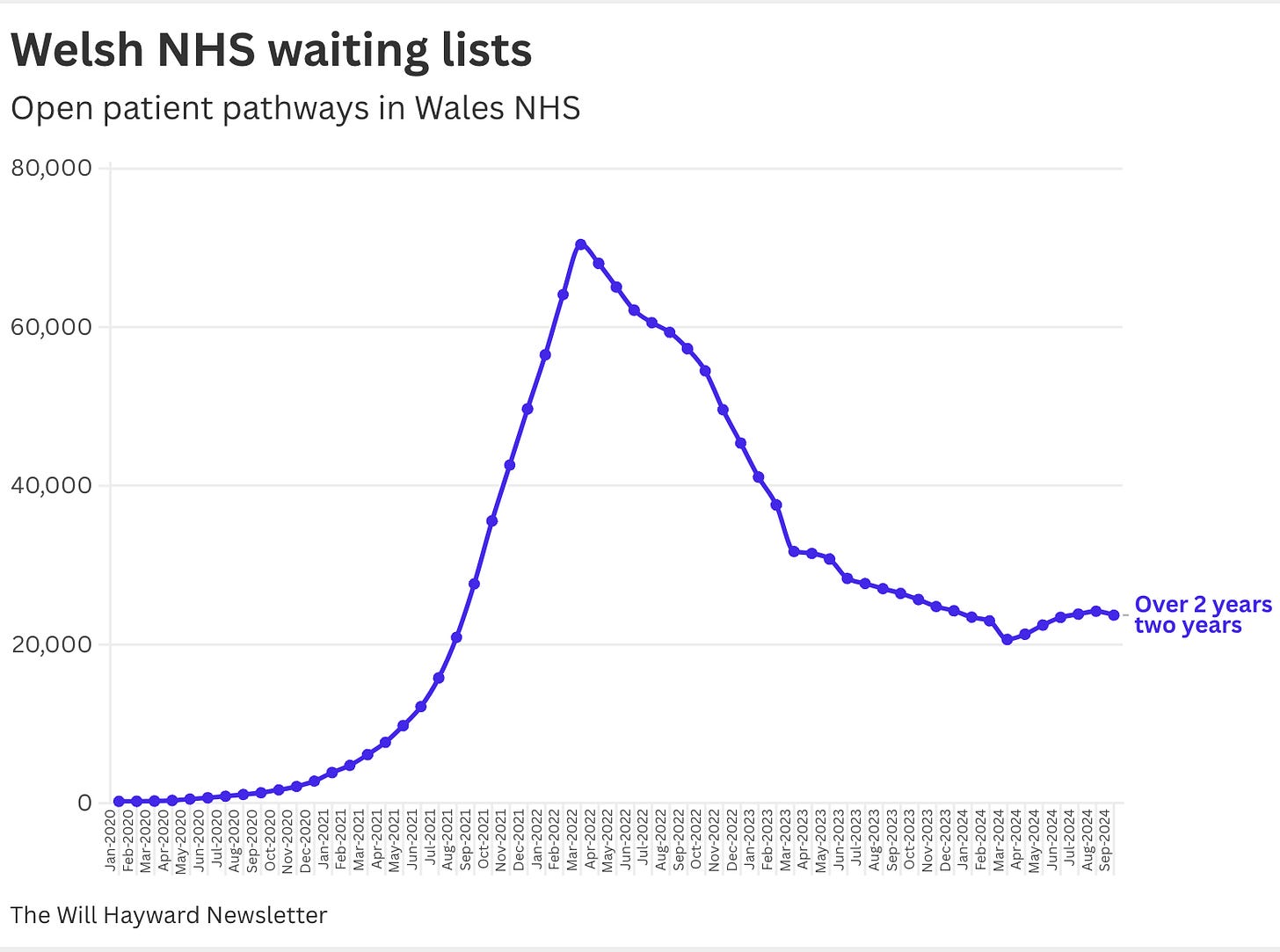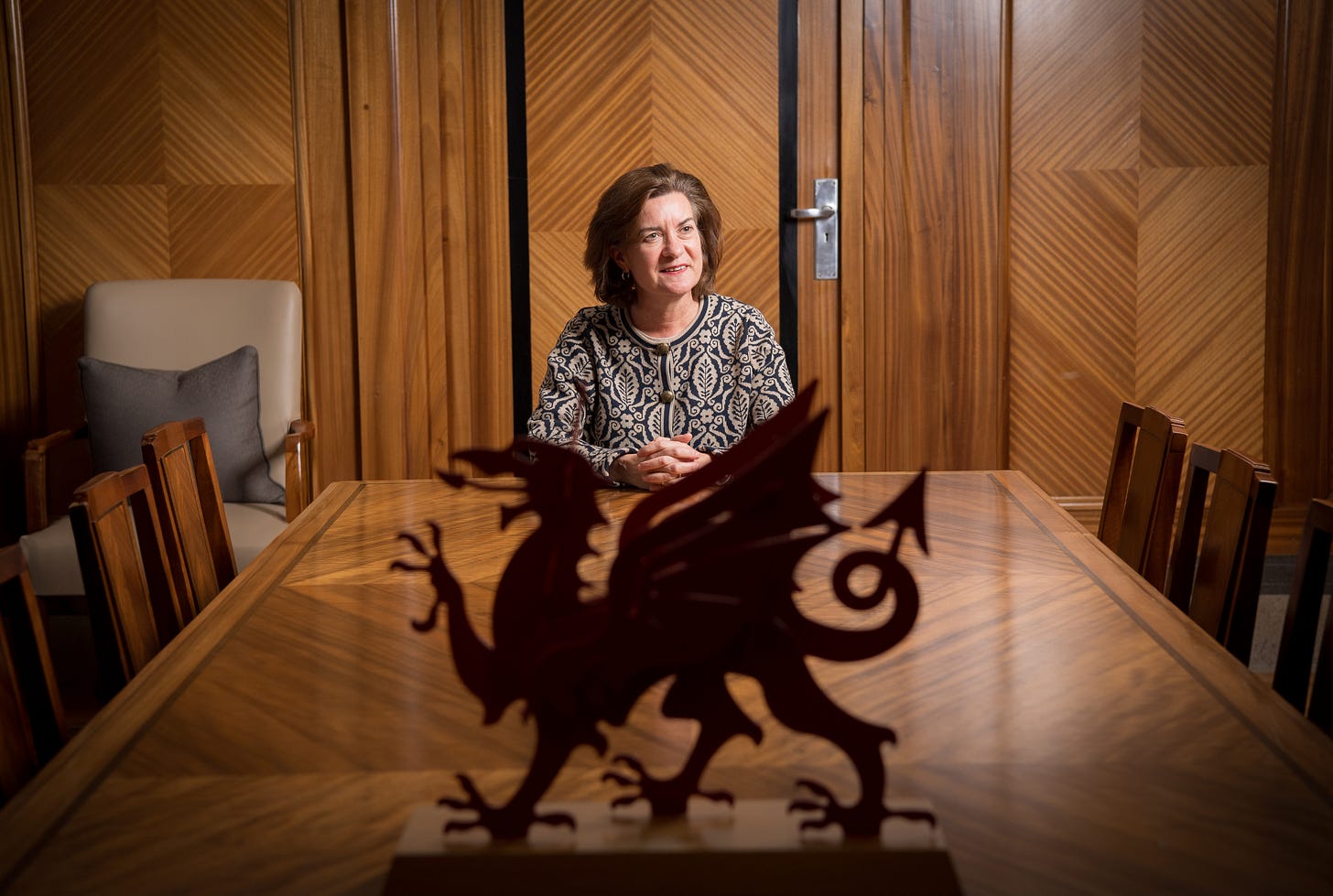The Eluned Morgan interview
I sat down with the First Minister who made a big commitment on waiting lists
Bore da!
Two newsletters in two days. What a treat.
Last week I sat down with Wales’ First Minister Eluned Morgan at Cathays Park in Cardiff. During our interview there were some real insights into her mentality heading into the 2026 election.
I was taken aback by how willing she was to give concrete numbers to how much she hopes the Welsh NHS waiting lists are going to go down over the next six months. The thing that made me even more surprised was how ambitious it was.
Given that not everyone who reads this newsletter is immersed in Welsh politics, I am going to break the interview up into sections and give a bit of context to each answer.
But first a few words from our sponsor:
This newsletter is sponsored by Hello Starling. A proudly Welsh company, Hello Starling plan and buy media, backed by data, which is designed to get maximum attention and measurable results. They specialise in getting eyes on your organisation, product and website. If you are looking to get a return on investment, a change in perception, more visitors, more subscriptions, a bigger audience or a happier audience, I highly recommend you check them out here. In doing so you help support this newsletter.
The NHS - a 66% fall in long waiting lists within six months?!
NHS waiting lists are the big problem facing Welsh Labour. If they go into the 2026 Senedd election with the 2+ year waiting lists still incredibly high they are in a terrible position. The graph below shows how those lists have changed over the last few years:
As you can see there was a big spike during Covid. The lists then came down quickly but in the last eight months they have stagnated and even started to rise again.
The Welsh Government has just announced a £50m cash injection to clear these waits (using overtime and the private sector). This was the exchange between myself and the FM on the issue:
Will Hayward: “I remember speaking to you after the election in 2021 when you were the health minister. You said that you would hope that the two-year backlog would have been cleared by 2026. Obviously, that's not going to happen. There's over 23,000 people still waiting on those especially long waiting lists. How much could that have gone down by the time we come to May 2026?
Eluned Morgan: “Well, let's just be clear, it's come down 66% since 2022 so that is a significant reduction in the longest waits.”
WH: It hasn't really changed in eight months.
EM: Since 2022, there has been a 66% reduction in the longest waiters. I know because I sat in the meetings week after week after week, analysing, probing, and making sure that I was breathing down their necks
Have we got further to go? Yes, we have. There's a particular problem in Betsi Cadwaladr Health Board. But I'm confident we're going to get down to some pretty low levels by the time we get to next spring on the two-year waits. There is a particular issue in Betsi, that's the really challenging bit, but a lot of the other parts of the NHS in Wales are now are making substantial strides.
WH: So are those two-year waits predominantly a Betsi problem then?
EM: We are looking at maybe four fifths of the problem, by the end of the spring, being in that Betsi area. Obviously we need to do what we can to stand by them, to try and address that particular issue. It is in particular areas, particular specialisms, that we need to focus on.
WH: At the moment, the over two-year waits are at 23,000. Where could they by the spring?
EM: So I think we'll be down to around 8,000 or so for two-year waits. We just put £50 million in, and that should make a significant difference, but that obviously depends on everybody doing what they tell us that they can do, and what they can deliver.
WH: Over the last eight months we have seen, at most, a 2% fall in two-year waits. But now you say that you think there could be more than a 50% fall by next spring?
EM: That additional £50 million will make a big difference. And the other thing that you've got to bear in mind is that actually, it's been really difficult because we didn't have as much money as we'd hoped before [previously]. Austerity has meant that we couldn't do things as quickly as we'd like. It is much easier to clear these things when you pay people to do overnight and weekend work. If there's no money to pay them, they can't do it.
WH: How are you practically going to make this happen?
EM: We now have these surgical hubs. So we've got one that's opened in Swansea. They were massively challenged for a very, very long time. Since we've opened that surgical hub, the lists have come tumbling down. In a country like Wales, because we don't have these massive population centres you don't have two hospitals in the same place where you can separate urgent care from planned care. You can do that in Cardiff, but there's nowhere else you could do that really. We've developed a new hub now in Swansea, and it means that your daily plan doesn't get knocked out all the time by people coming through the front door with urgent cases
Well there is an awful lot to unpick there:
A two-thirds fall in six months?! - Fair play, she committed to a number. The First Minister said that by the spring we will see two-year waits at 8,000 rather than the current figure of 23,701. If they achieve that, it would be quite an accomplishment.
Surgical hubs and the private sector are the answer - The FM is clearly putting her eggs in the surgical hubs basket. Groups like the Royal College of Surgeons have been calling for this since the peak of the Covid period.
Betsi continues to be a problem - The north Wales health board (which is the largest public sector organisation in Wales) has been in special measures on and off for 10 years. The FM indicated that by the spring it could constitute 4/5 of Wales’ longest waits as other health boards see falls. This is going to be pretty tough to hear for the 694,000 who live in that area. According to Ms Morgan, part of the issue is that due to the more spread out nature of populations in the north, it is harder to set up separate surgical hubs.
What has devolution done for Wales?
As anyone who reads this newsletter will know, I am personally an advocate for devolution and think it has the potential to be an important vehicle for change in Wales. However, it clearly has issues and some areas of the Welsh public are losing faith in it. I therefore asked the FM to make her case for it:
WH: Devolution has been in place for 25 years now, how has it benefited the people of Wales?
EM: The first thing to say is that we are a much more confident nation. There are people in Wales today who are running our organisations, who are running our businesses, that are involved in government, who are in our education institutions, who would have left, but have stayed because there's a reason to stay. We have these big institutions. We have good jobs, and that has anchored people in Wales.
There was a little bit of a mentality that if you want to get on, you've got to get out. I don't think that's true anymore, and that is a fundamental shift. Now, have we got work to do? Yes, we've got work to do. And you know, I'm very clear that we need to get the economy moving better. We need to make our education systems better. We need to tackle issues in relation to health.
WH: Obviously devolution provided more of an infrastructure around Wales but if you're someone living in the Valleys, and you don't have the nice jobs that have been secured through devolution, what would you say to them is better now, that wouldn't have been the case if we had no devolution?
EM: Look, it's the things that they take for granted, that they don't recognise are delivered by Welsh Government. The fact that they don't have to pay for prescriptions in Wales. There's a lot of sick people in the Valleys, and they get their prescriptions for free.
They get free transport if they're over 60, that's a significant contribution to them. We've got tons of new schools all over the Valleys that we have invested in because Welsh Governments have done that. We've put more money into the health service than there's been for decades. So all of those things are things that touch people's lives every single day.
Have we still got challenges? Absolutely, we've got challenges. But I hope what people recognise is that we're on the side of the people. We're trying to make changes that affect them.
After 25 years, you would hope that the answer to my first question wouldn’t simply be “we have lots of government jobs” and “your prescriptions are free”.
In an ideal world this answer would have been something like “our educational outcomes are the best they have ever been, we are the leading place for green investment and it is the best place in the UK to grow old because we have championed preventative healthcare”.
Now I am not trying to be flippant here. I actually do think that the fact Welsh people can remain in Cymru and access good government jobs is a good thing, plus free prescriptions has easily proved the Welsh Government's most popular policy. But when you are trying to convince a nation of people that something is working for them I think you need to have something stronger.
So I asked again:
WH: A quarter of a century on, polling suggests that people in Wales, in the main, do support having control over their own affairs, but there has been a growing discontent and a feeling it is not making their lives better. Can you make that case to them as to why they need to stick with this?
EM: I think decisions impacting Wales should be made by the people of Wales and by their representatives, and I think that is the clear case for devolution.
The case is we're closer to the people, that we've got our ears to the ground, and that we are a party that listens, that responds, and that is making a difference to people's lives, that understands we are the ones focusing on economic growth, on prosperity, on the green agenda, and on creating social justice and equality for people. All of those things, I think, are in tune with the values of the Welsh public.
There are two points I want to make about this response:
The argument that decisions impacting Wales should be made in Wales is a very strong one that resonates with people. The reason why Reform are not coming out against devolution is because they know that it will turn off some of the people they want to win over.
You will notice how an argument for devolution quickly turns into an argument in favour of the Labour Party. Because Welsh Labour have been in power for the whole of devolution, in the minds of many (including themselves), they are devolution.
This is a problem in my opinion because it leads some in Wales to believe that if you don’t want Labour, you need to oppose the existence of the Senedd. This is not healthy. Devolution is a vehicle for giving people in Wales choice, it shouldn't be abandoned because of the perceived failings of one party.
HS2 money and the relationship with Starmer
This newsletter has covered extensively the outrage surrounding HS2 and how the decision to class it as an England and Wales project (despite being entirely in England) has robbed Wales of £4bn. This was our exchange on that issue:
Keep reading with a 7-day free trial
Subscribe to The Will Hayward Newsletter to keep reading this post and get 7 days of free access to the full post archives.





